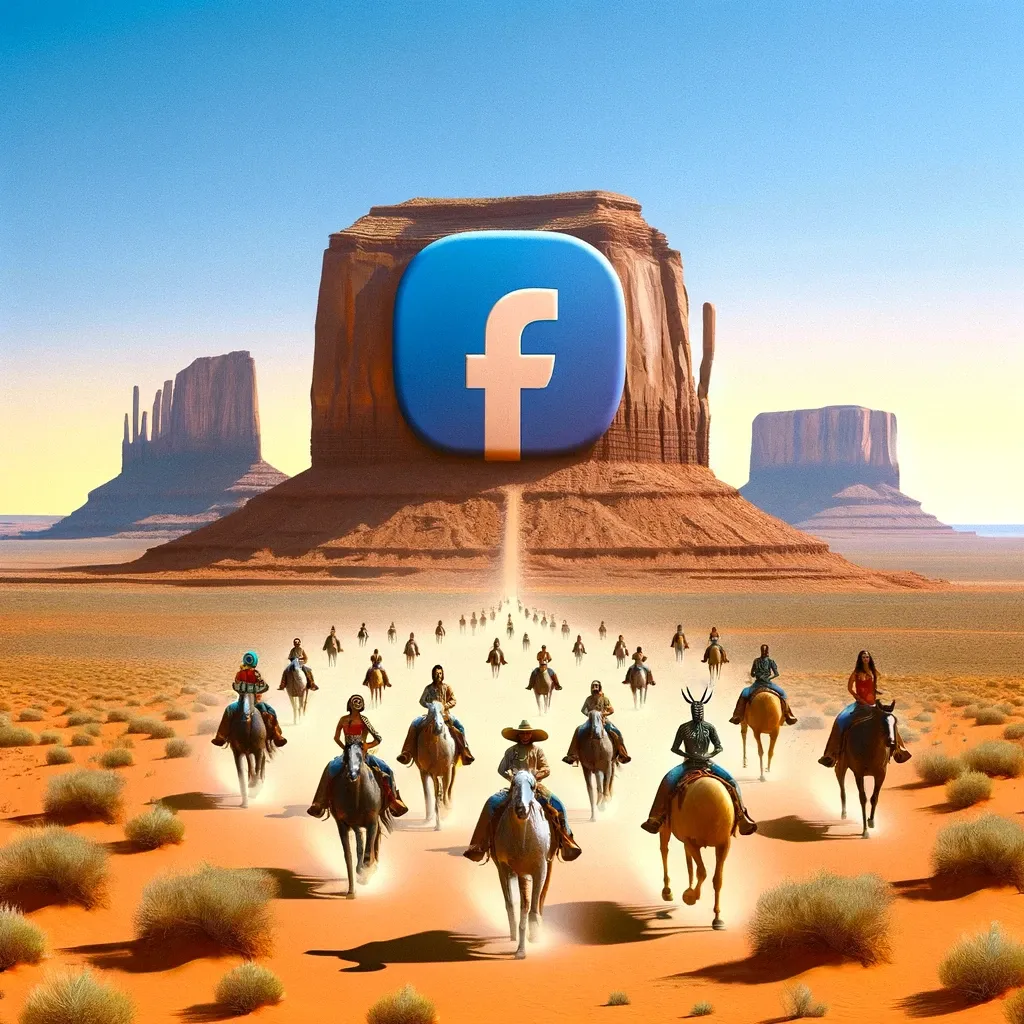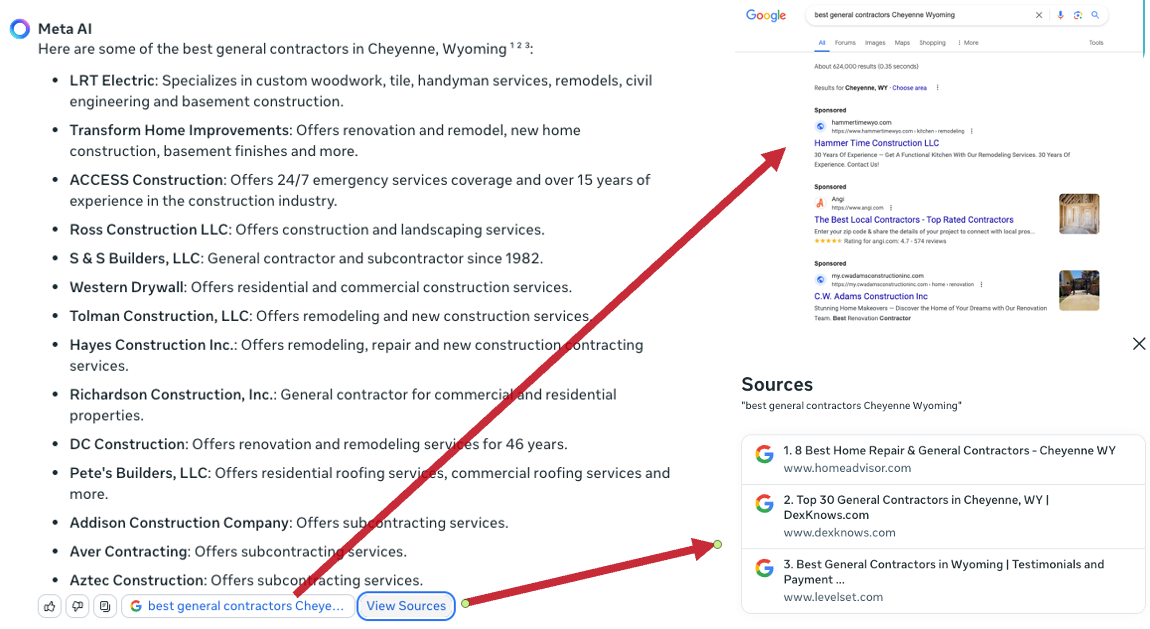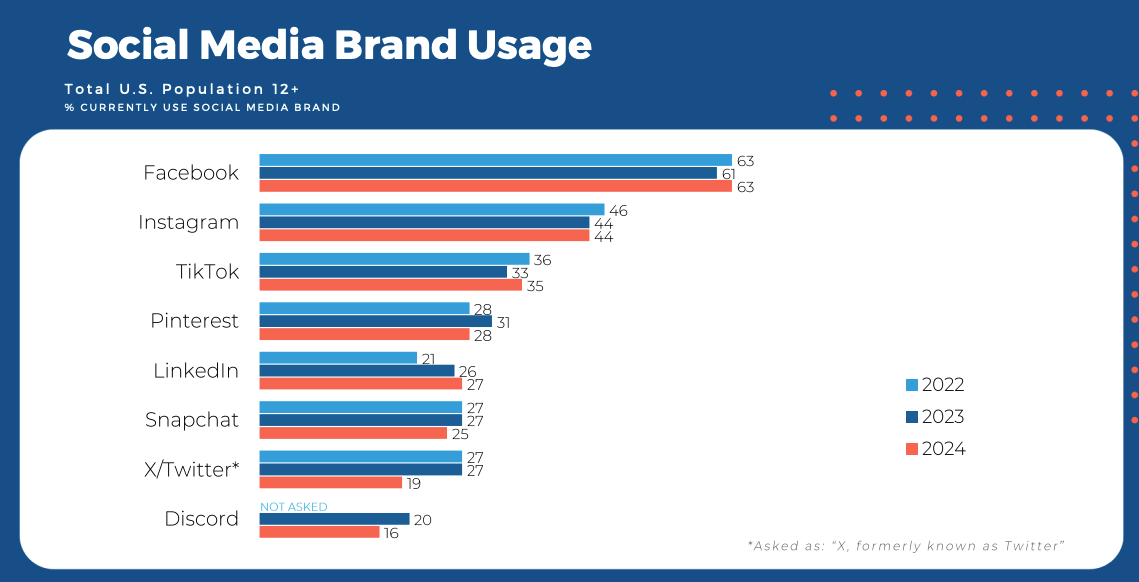Meta.ai Search, Home Services & Local SEO, Social Plateau

Meta.ai: Another Go at Local
Last week Meta released its updated AI assistant (Meta.ai), also integrated into Facebook, Instagram, WhatsApp and Messenger. It's the latest consumer-facing AI offering in a growing list that includes Perplexity, Google Gemini, Claude, Grok and ChatGPT. It does multiple things, similar to Gemini and ChatGPT, including image and code generation. While it's less versatile than ChatGPT, it's very fast. Meta.ai may be a better assistant for local search other AI platforms, because it draws upon Google and Bing. I asked Meta to identify its local data sources; here's a partial list: Acxiom, Apple Maps, Bing Places, Citysearch, Eventbrite, Facebook Places, Foursquare, Google, Google Maps, Google My Business, Google Places, HERE Maps, InfoGroup, Instagram, Kayak, Microsoft Bing, OpenTable, TripAdvisor, Yellow Pages, Yelp. (Each time I said, "Is that everything?" it came back longer.) Most of my informal testing produced results from Google. Meta.ai also allows you to initiate the verbatim query on Google with a single click (see below). The upgraded assistant gives Meta a chance to get back into (local) search, an explicit use case mentioned in the blog post. There's also the ability to "access real-time information from across the web without having to bounce between apps." That's the most interesting angle.

Our take:
- Facebook should have been a leader in local search; however, it repeatedly stumbled in the past. We'll see what happens with Meta.ai.
- There's not enough context for most buying decisions, but its lists may be enough in some situations (e.g., what are some good restaurants near XX?).
- Will the integration of this across Meta's apps, especially Instagram and WhatsApp, siphon off some search queries that would've gone to Google?
Home Services & Local Ranking
At the recent New York SEO meetup LSG's Andrew Shotland laid out a methodology for scaling local SEO with AI. He also presented findings on the current state of local SEO through the lens of the Home Services vertical. Among Shotland's findings, Forbes outranks incumbents in the category. Shotland admits to being "kind of shocked" at this but, as in other content categories, Forbes is using its domain authority to rank for queries unrelated to its core business. According to Shotland, Forbes' local listings "are basically reskinned Angi's affiliate results." However, Google's site reputation abuse policy may wipe these rankings out. From all this Shotland infers Google's heavy reliance on "trusted domains," which argues for brand building. He explains, "Over the past year ... the biggest sites are getting bigger." This is reinforced by research from SparkToro and Glenn Allsopp, and Google antitrust trial documents, as well as AJ Kohn's excellent earlier analysis. Interestingly, Shotland says Google-owned SERP features have declined by 9% (perhaps a function of Europe's DMA) and LSAs have become less visible. The latter tracks with our anecdotal observations, though LSAs are very effective when present. Shotland also believes that local links still really matter, despite Google statements to the contrary.

Our take:
- The deck points out that Reddit, Quora and forums are spiking in the SERPs. Shotland suggests developing a Reddit strategy, although Google will probably dial it back because of growing criticism.
- He also argues against targeting head terms vs. the long tail. And, "If you want non-brand traffic, your best bet is to be a brand."
- Not discussed in-depth is getting GBP right, including reviews and images, although consumer priorities and engagement vary considerably by vertical.
Social Media Has Peaked
While TikTok and Instagram usage have grown, as an overall category social media has plateaued. That's according to The Infinite Dial 2024 report from Edison Research, which typically tracks podcast listening. The total social media audience in the US is estimated at 235 million and has been essentially flat for the past five years. The estimate, which is extrapolated from survey data, includes Americans over 12. The total US population is 333 million. Facebook is dominant over all other platforms, followed by Instagram, with TikTok in third position. For its part, Twitter/X has lost significant ground since the Musk takeover. However, as the chart below indicates, most usage is stable or flat – although LinkedIn grew in 2023, perhaps partly from Twitter refugees. Facebook is used by more people over 35 than other social sites, while TikTok and Instagram are most heavily used by 12 - 34 year olds. From a demographic targeting perspective, Instagram has become Meta's platform for people under 35. Facebook is for people over 35. Overall, Facebook is the top marketing channel used by small business owners. Instagram is number two. Threads isn't really on their radar.

Our take:
- We've reached peak social media. Growth is possible but probably only at the expense of others in the category.
- As we previously discussed, social media has near total awareness and adoption by smaller marketers, while GBP does not.
- TikTok's parent is about to be asked to sell to a non-Chinese buyer. The paradox is: only the biggest tech companies could afford it, which would probably be opposed by regulators.
Recent Analysis
- Near Memo episode 154: Ad sales up; physician guilty of violating federal reviews law; meh content will fail.
Short Takes
- Google tests "post" button in Google Business Profile panel.
- SEOFOMO meetup recap: SEO strategies for a post-SGE world.
- Deconstructing the components of Google's SGE results.
- How to write a critical online review without being a jerk (WaPo).
- Google Maps will now help you find the closest EV charger.
- Yellow Pages segment "hammered" by recent Google updates.
- Google: all your "ad strength" questions answered.
- Ads coming to Threads.net this year (of course).
- Google quietly becoming a merchant marketplace for product queries.
- Google search boss warns employees: more pressure ahead.
- Competition, capitalism and the need to "rewild the internet."
Listen to our latest podcast.

How can we make this better? Email us with suggestions and recommendations.

